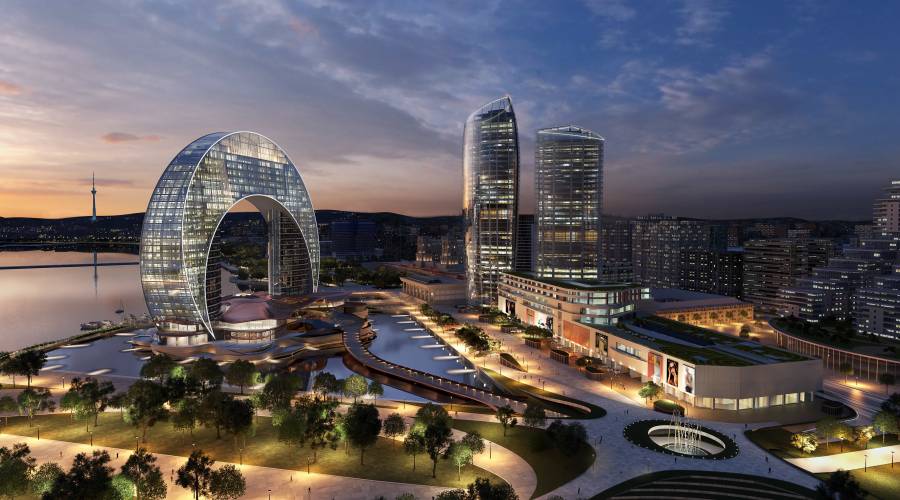
Development of hospitality industry of Azerbaijan.
Azerbaijan’s hotel industry is growing rapidly with new brand hotels, digital innovations, and sustainable practices, boosting tourism, creating jobs, and enhancing the country's economic and global appeal.
The hospitality industry in Azerbaijan has seen significant growth, particularly in the post-independence era, driven by increased tourism, international events, and the country’s strategic location between Europe and Asia. The hotel sector, as a core component of the tourism infrastructure, plays a crucial role in supporting this development. In recent years, Azerbaijan's hotels have adapted to international standards and local cultural needs, offering a range of options for business and leisure travelers alike.
Growth of the Hotel Industry in Azerbaijan
Azerbaijan’s hotel industry has experienced rapid growth due to several factors:
- International events: Azerbaijan has hosted major global events, including the Eurovision Song Contest (2012), European Games (2015), Formula 1 Grand Prix races (since 2016), and cultural and sports championships. These events have drawn millions of international tourists, boosting the demand for high-quality accommodations.
- Increased tourism: The State Tourism Agency of Azerbaijan reports a steady increase in tourist arrivals. Following the COVID-19 pandemic, tourism is rebounding strongly, especially with the lifting of travel restrictions and the growth of regional travel. Visitors from neighboring countries (Russia, Turkey, Iran) and Europe are contributing to this resurgence. By 2023, the number of international tourists exceeded 1.5 million, with a strong upward trend forecast for the coming years.
- Government initiatives: The Azerbaijani government continues to prioritize tourism, aiming to diversify the sector by investing in sustainable tourism, eco-tourism, and adventure tourism. The “Tourism 2023 Strategy” and other initiatives seek to enhance infrastructure, particularly in regions like Gabala, Sheki, and the Caspian coastline, with a strong focus on attracting higher-spending tourists.
Latest Developments in the Hospitality Industry
Recent developments include several large-scale hotel openings, investments in regional tourism, and advancements in hospitality technology:
- New Hotel Openings: The Baku hospitality market has welcomed new international brands, including the Ritz-Carlton Baku and Wyndham Garden Baku, expanding the city’s portfolio of luxury and mid-range accommodations. These new entrants have contributed to an increase in room capacity, especially catering to the growing business and conference tourism sectors.
- Digital Transformation: As the global hospitality industry increasingly adopts digital solutions, hotels in Azerbaijan have embraced innovative technologies such as contactless check-in, online booking platforms, and advanced CRM systems. These digital upgrades help meet the evolving needs of travelers and improve operational efficiency.
- Sustainable Practices: Following global trends, many hotels are introducing sustainability initiatives, such as energy-efficient systems, waste reduction programs, and eco-friendly construction. The push toward sustainable tourism is gaining momentum in Azerbaijan, aligning with the government’s goals for long-term tourism development.
Current Landscape of Hotels in Azerbaijan
As of 2024, Azerbaijan offers a wide range of accommodation options, from luxury brand hotels to boutique establishments and local hotel chains. Baku remains the hub of hospitality, but tourism has expanded to regions like Sheki, Gabala, and the Caspian Sea coastline, resulting in more regional hotels.
International Brand Hotels in Baku: The capital city of Baku is home to some of the world’s leading hotel brands, offering luxury accommodations for international travelers. Notable brand hotels include:
- Four Seasons Hotel Baku: Known for its blend of classic elegance and modern amenities.
- Fairmont Baku, Flame Towers: A symbol of the city’s architectural and urban development, offering stunning views of the Caspian Sea.
- Hilton Baku: Located along the waterfront, it offers excellent business and leisure facilities.
- JW Marriott Absheron Baku: A luxurious property situated in the heart of the city, catering to business and leisure travelers alike.
- InterContinental Baku: Combining modern luxury with a touch of local culture.
- Boulevard Hotel Baku Autograph Collection: Part of the Marriott portfolio, located near Baku’s waterfront, known for its contemporary design and extensive conference facilities.
- Hyatt Regency Baku: A well-established international brand, known for its business services and comfortable accommodations.
- Radisson Blu Plaza Hotel Baku: Offering a combination of business amenities and leisure options.
- Holiday Inn Baku: A popular mid-range option for both tourists and business travelers.
- The Ritz-Carlton Baku: A recent addition, offering luxury services and accommodations.
- Wyndham Garden Baku: Another recent development, catering to both business and leisure travelers with modern amenities.
Local Hotel Chains: In addition to international brands, local companies have established a strong presence in the hotel industry. For example, the Absheron Hotel Group manages several key properties, such as the JW Marriott Absheron Baku and the Intourist Hotel Baku. These hotels are known for combining local traditions with high service standards, offering both business and leisure travelers a unique Azerbaijani experience.
Boutique and Heritage Hotels: Boutique hotels and heritage properties have also gained popularity, offering visitors a more personalized experience. The Sheki Palace Hotel in Sheki, for instance, offers a cultural experience rooted in the country’s rich history. In Baku, smaller boutique hotels have also emerged, catering to guests seeking intimate settings and cultural immersion.
Impact of Brand Hotels on Tourism and the Economy
The presence of both international and local brand hotels has significantly boosted Azerbaijan’s appeal as a tourist destination. These hotels provide employment opportunities, contribute to the economy, and elevate the country’s international image. The standards set by international chains have also pushed local hotels to raise their service levels, contributing to an overall improvement in the quality of hospitality across the country.
Economic Impact: The hotel industry plays a vital role in the Azerbaijani economy. According to the State Statistical Committee of Azerbaijan, the hospitality sector contributes significantly to the country’s GDP. Brand hotels, in particular, attract high-spending tourists and business travelers, which helps generate revenue through services, dining, conferences, and events. Additionally, brand hotels have facilitated foreign direct investment into the Azerbaijani economy, helping to develop a sustainable tourism industry.
Job Creation: The growing hotel industry is a major source of employment. Brand hotels provide jobs for thousands of locals in sectors like hospitality management, customer service, culinary arts, and event planning. Additionally, these hotels often engage in corporate social responsibility (CSR) initiatives, offering training and development programs to upskill local staff, further improving the workforce’s quality.
Raising Hospitality Standards: International brand hotels have set high standards for service quality, amenities, and guest satisfaction. These standards have prompted local hotels to adopt best practices in hospitality management, ensuring that Azerbaijan can compete with top tourist destinations globally. The introduction of global hospitality technology and operational procedures has further modernized the local hotel industry.
Challenges and Future Prospects
Despite the impressive growth of Azerbaijan’s hotel industry, the sector faces certain challenges. The COVID-19 pandemic, for example, temporarily disrupted the tourism flow, leading to reduced occupancy rates in both brand and local hotels. Additionally, there is a need for improved infrastructure in certain regions to attract more tourists outside of Baku.
Moving forward, the government’s focus on diversifying tourism by promoting eco-tourism, adventure tourism, and cultural tourism will likely stimulate further development in the hotel sector. Regions like Sheki and Gabala, with their rich cultural heritage and natural beauty, are expected to see more investments in hotels that cater to niche tourism markets. Additionally, Azerbaijan’s potential to become a medical tourism destination, particularly through the development of wellness resorts and spa hotels, is another promising avenue for growth.






